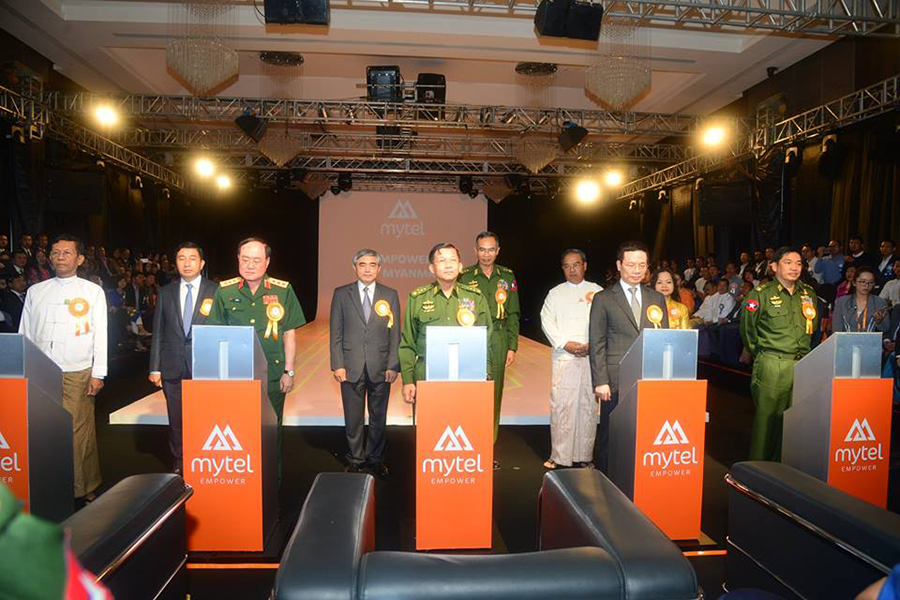YANGON — Myanmar’s private telecom operators stressed the importance of a fair playing field with the official launch of a new competitor that has the backing of the country’s powerful military.
The country’s fourth and latest telecom provider, Mytel, had its official launch on Saturday in Yangon.
Mytel is 49 percent owned by Viettel, a telecom provider owned by Vietnam’s Defense Ministry, and 28 percent owned by Star High Company, a subsidiary of the Myanmar Army’s Economic Holdings Ltd. A consortium of 11 local companies, Myanmar National Telecom Holding Public Ltd., owns the rest.
The launch was attended by senior officials from both Vietnam and Myanmar, including Myanmar Army chief Senior General Min Aung Hlaing, the defense minister and the heads of the navy and air force.
Mytel was granted an operating license on Jan. 12, 2017, and started selling SIM cards in some regions in mid-March.
While some netizens have vowed to boycott the military-backed provider, others say they like the company’s promotions, which make it cheaper than its competitors.
The operator is offering 500 MB of free mobile data and 50 minutes of on-network calls from June to September along with other promotional bonuses.
Ma Shwe Yinn Mar Oo, external communications manager for Norway’s Telenor, told The Irrawaddy that the country’s telecom sector was becoming more competitive.
“We expect that the fourth operator will try its best to get market share. And at the same time, we also anticipate to have healthy competition,” she said.
Mobile penetration in Myanmar has skyrocketed since Telenor and Qatar’s Ooredoo rolled out their networks in 2014, breaking a monopoly by state-owned Myanma Posts and Telecommunications (MPT) that for many years had put the price of a SIM card out of reach for most people.
In a joint announcement in February, the three operators said they had a combined 53 million subscribers. MPT, which partnered with Japan’s KDDI in 2014, led the way with 25 million subscribers, followed by Telenor with 19 million and Ooredoo with 9.5 million.
In the announcement, released just before Mytel started its pilot sales, they pledged to abide by sound pricing practices, including floor pricing and no free SIM cards, as set out in the Pricing and Tariff Regulatory Framework of June 2017.

“It is important that all operators abide by the same rules, which is something we will continue to stress to the regulator,” Ooredoo Myanmar CEO Vikram Sinha told The Irrawaddy.
“With a level playing field, we are confident in our ability to compete and thrive,” he said.
Under the current Tariff Regulatory Framework, telecom operators cannot charge less than the fixed floor prices for their services, including rates on calls, SMS and mobile data.
However, through promotions they can reduce the floor prices by as much as 40 percent, said U Myo Swe, deputy director general of the Post and Telecommunications Department at the Ministry of Transport and Communications.
But he said Mytel has been allowed to reduce the floor prices by 70 percent during its promotion period — which typically lasts three months — because it still had a small market share and would have little effect on the established providers.
According to a report in 7Day Daily, Mytel has distributed 3 millions SIM cards to shops and sold more than 100,000.
At the launch, the army chief, Snr-Gen Min Aung Hlaing, said Mytel’s network already covered about 72 percent of the country and, if the operator’s plans came to pass, would reach 93 percent of the population by the end of the year.
The Post and Telecommunications Department is presently redrafting the Tariff Regulatory Framework in collaboration with the operators and says the changes will better serve operators and subscribers alike. The department is taking public comment on the draft until June 30 and hopes to have it finished in four to five months.
U Myo Swe said all four operators will have to abide by the new framework once it takes effect but added that Mytel would be afforded some leeway until then.











